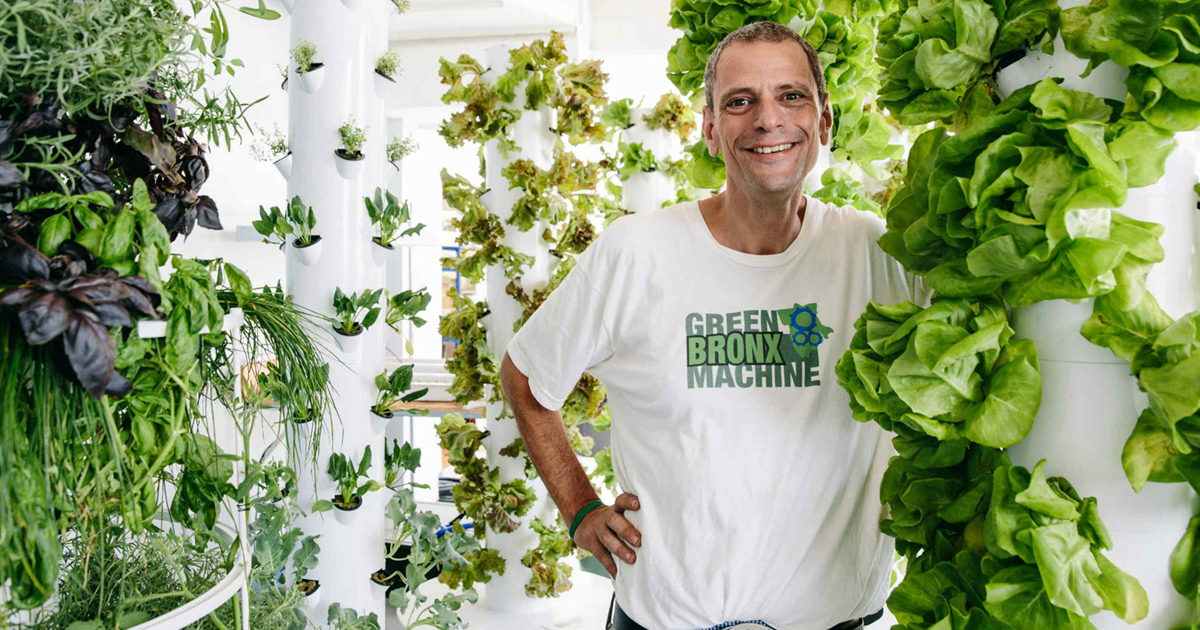Growing Plants to Grow Students with Stephen Ritz

Stephen Ritz isn’t your average farmer.
His vegetables don’t grow in fields on large plots of land. His quirky attire—a cheese head cowboy hat, bright green sneakers, a T-shirt and his signature scrabble-tile bowtie—is far from the stereotypical farm field-ready wear. And, his most fertile soil is found in the unlikeliest of places: the South Bronx
But, it all makes sense for Ritz, who wouldn’t call himself a farmer at all. Sure, he grows vegetables, but his favorite crop is students.
Ritz is the founder and CEO (“Chief Eternal Optimist”) of Green Bronx Machine, a nonprofit organization building healthy, equitable, and resilient communities through inspired education, local food systems, and 21st century workforce development. Believing that students shouldn’t have to leave their communities to live, learn, and earn in a better one, Ritz and Green Bronx Machine aim to transform communities that are fragmented and marginalized into neighborhoods that are inclusive and thriving.
The Power of a Plant
It starts with food.
“For so many, food is the problem,” Ritz told a group of students at Babson College this winter. “But, for us, food is the answer.”
The South Bronx is one of the nation’s largest food deserts, meaning that there is a lack of access to affordable healthy options. Thirty-seven percent of South Bronx residents experience food insecurity. There’s a 59 percent child poverty rate, too. As those elements converged, Ritz noticed alarming trends in his classroom: growing waistlines and declining health.
“I am not willing to accept the things I cannot change,” he said. “So, I’m going to change what I can’t accept.”
Change began with an accident in Ritz’s classroom when a forgotten box of bulbs, placed behind a radiator, eventually bloomed into daffodils. “The boys wanted to give them to the girls and the girls wanted to bring them to their moms, some kids suggested that we sell them,” Ritz told nycfoodpolicy.org. “And, literally I think I planted 15,000 daffodil bulbs with gang members across New York City that year doing a beautification project commemorating 9/11, and that’s how we learned about gardening.”
In the classroom, Ritz and his students learned together to grow vegetables in floor-to-ceiling tower gardens. As the plants grew, students harvested, cooked, and even sold the crops while learning healthy habits along the way. “I don’t expect every child to be a farmer, but I expect them to read about it, write about it, and be engaged.”
That engagement translated to dramatic increases in the school’s key performance indicators. Attendance at the South Bronx school skyrocketed from 40 to 93 percent. In the first year of the program, out-of-class time and behavioral incidents decreased by 50 percent. The following year, they saw a 45 percent increase in state test scores.
“Seeds are like people, they need love to grow and become successful,” said Ritz. In the classroom, both the seeds and the students receive the nurturing needed to grow and thrive.
Growing Something Greater
Green Bronx Machine’s growth extends far beyond the tower-garden-clad walls of Ritz’s classrooms. His students travel all over—from Boston to the Hamptons and beyond—to install green walls, and earn living wages while doing it. They’ve grown more than 50,000 pounds of vegetables, and routinely generate enough produce to feed 450 students healthy meals. And, in a community with no grocery store, they send 100 bags of groceries home with students each week.
“The borough known for funky fresh beats is now known for fresh red ones,” joked Ritz.
As he looked to expand, Ritz realized he couldn’t scale himself, but he could scale the method. So his playbook, Green Bronx Machine Classroom Curriculum, is available for schools, community programs, and nonprofit organizations to purchase and implement. So far, it’s being used in 5,000 schools to grow plants and students across the United States and in Canada, Dubai, and other countries.
Though Green Bronx Machine has caught the eye of many a potential sponsor, Ritz turns most of them down. If it doesn’t align with his values and the programs mission, he doesn’t want it. “I’ve turned down a lot of money. If a company isn’t going to be part of the solution, I don’t want to be a check on their CSR list,” said Ritz. “Once you sell your soul, you can’t get it back.”
These days, Ritz spends a lot of time traveling, spreading the word about his story and his students. He has earned a slew of accolades, including being a top 10 finalist for the $1m Global Teacher Prize. In his book, The Power of a Plant, he aims to inspire readers to “make epic happen” right in their own communities. And, above all, he hopes that the Green Bronx Machine story encourages others to roll up their sleeves, get a little dirty, and grow something great.
Photo credit: StephenRitz.com
Posted in Entrepreneurial Leadership
